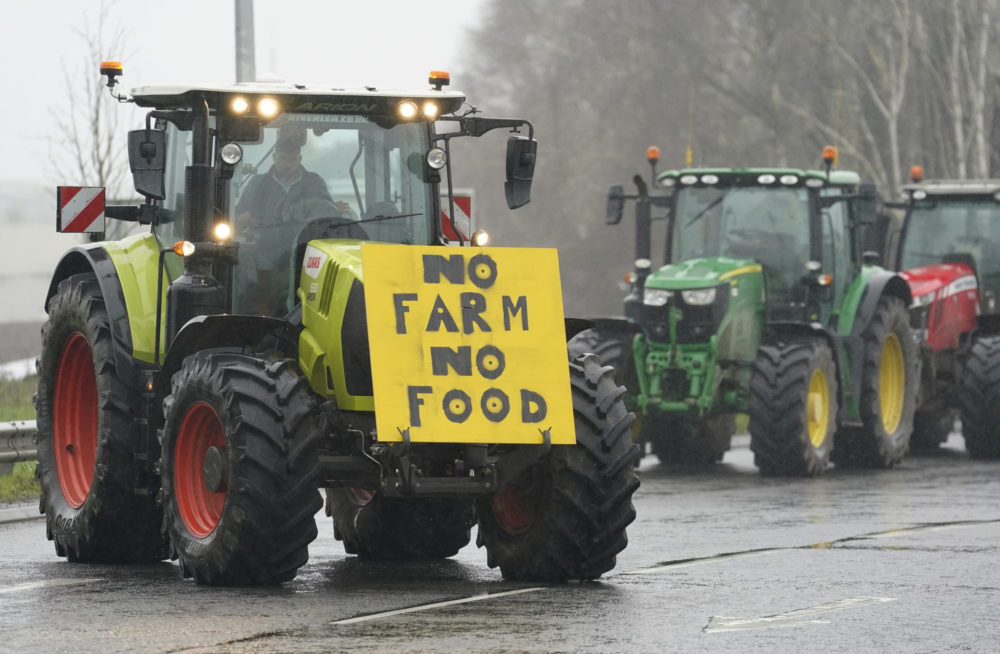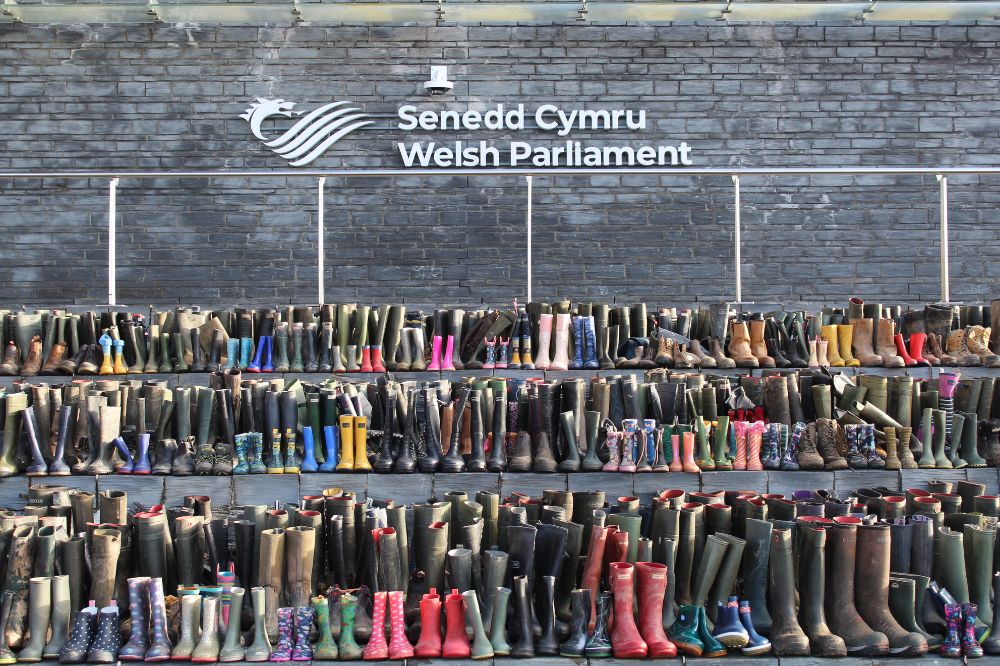New time frame announced for controversial farm subsidy scheme

Emily Price
A new timeframe has been announced for the role out of a controversial Welsh Government farm subsidy scheme which led to protests across Wales.
Responding to feedback to a consultation on the Sustainable Farming Scheme, Cabinet Secretary for Rural Affairs Huw Irranca-Davies said “clear changes” needed to made before the programme could be introduced.
The Welsh Government paused the roll out of the scheme following mass protests which saw thousands of wellies lined up outside the Senedd in a symbolic display of farming job losses.
Under former First Minister Mark Drakeford, the SFS would have required farmers to farm sustainably by bringing their existing tree and woodland cover up to 10% – and earmarking another 10% for habitat.
Farmers and opposition politicians in the Senedd argued that this would never be practical whilst running a farm business and unions said the tree cover requirement represented a “major barrier” to scheme entry.

Roadshows
Following the election of First Minister Vaughan Gething, the Welsh Government launched a consultation and hosted several roadshows to connect with farmers and explore future agricultural support for Wales.
The newly appointed Cabinet Secretary for Climate Change Rural Affairs said that no decisions on the scheme’s design have been made yet.
But he added that he understood the concerns raised by farmers and wouldn’t be introducing the scheme until it was ready.
Announcing the new timeframe on Thursday (July 11) Mr Irranca-Davies said: “We intend for the SFS to commence in 2026. This will be preceded by a Preparatory Phase in 2025 providing advice and support to farmers in advance of the Scheme’s introduction.
“We will publish further details on the Preparatory Phase for 2025 in due course, along with details on the Basic Payment Scheme in 2025 and other schemes which will be available prior to the introduction of the SFS.
“I know that this has been an unsettling time for many farmers and their families. We will continue to work at pace to finalise the Scheme so that we can provide certainty about future support as soon as possible. By working together, we can ensure a sustainable agriculture industry in Wales for generations to come.”
The Welsh Government says sustainable food production is the core of proposals because the nature and climate emergency is the main risk to food production over the long term.
Design
Mr Irranca- Davies said: “We have already hosted two Ministerial Roundtable meetings. The purpose of the Roundtable is to further develop the partnership approach needed to finalise the design and implementation of the Scheme, building on previous phases of co-design and engagement. Whilst final decisions will be taken by Welsh Ministers, the Roundtable has an important role to play in shaping the Scheme.
“Alongside this, the Carbon Sequestration Evidence Panel has met twice and will over the summer consider any further and alternative proposals to achieve additional carbon sequestration within the Universal Actions of the Scheme.”
Changes
FUW President Ian Rickman said: “Welsh Government must continue to listen to Welsh farmers as the summary of responses to the latest SFS consultation is published today. The industry’s voice has been loud and clear and it has been a challenging process to get this far for everyone involved.
“It comes as no surprise that the consensus from the mammoth 12,000 farmers and organisations who responded to the consultation calls for significant changes to the scheme proposals.
“This was also the clear message from our members who responded individually, and fed their views into the Union’s comprehensive consultation response earlier this year. We are leaving no stone unturned in our efforts to make this scheme work for farmers.
“We welcome the remarks made by the Cabinet Secretary today as he commits to introducing the scheme only when it is ready. This needs to be an agricultural support scheme that provides stability for our food producing family farms in Wales and considers economic, social and environmental sustainability on equal footings. As a Union, this remains our ultimate goal.”
The FUW welcomed the announcement that the SFS will not begin until 2026 and that a preceded preparatory phase will take place next year.
Mr Rickman added: “There is an intense body of work being undertaken by the FUW with the Cabinet Secretary, stakeholders and Welsh Government officials, with extremely important discussions having taken place.
“FUW members can rest assured we are doing our utmost to negotiate a scheme that works for all farmers in Wales from 2026 onwards. This remains our commitment to Welsh farmers.”
Support our Nation today
For the price of a cup of coffee a month you can help us create an independent, not-for-profit, national news service for the people of Wales, by the people of Wales.








When has the Labour Party EVER supported farmers and the countryside?
While persuading farmers to vote for Brexit, against their interests, then doing deals with Australia and New Zealand, that the farmers are saying will help put them out if business, great help the Tory party turned out to be.
Role out (sic)?
pedantic I know.
Labour determined to cut massively the funding to farmers ,
The problem is the treasury they have run a cartel to keep food prices down and use the disposable income on mortgages and goods
The only person that benefits from high house prices are the banks and the share holders on goods
We need audits in the treasury to test their honesty
That’s not true, the payment amounts haven’t even been released but with the optional actions it is aimed to pay more to farmers than England’s SFI
However, most of the optional action (and indeed the universal actions) are simply designed to be cost neutral – as in they pay £ for £ for the cost incurred and income foregone by the farm business for undertaking the specified action (despite assurances to the contrary early in the ‘co-design’ process). If calculated over the lifecycle of the actions (rather than the lifetime of the scheme contract), there is a distinct chance for some proposed actions that productivity losses incurred long-term from undertaking some of the actions will significantly exceed the income generated from scheme membership. Undertaking optional actions… Read more »
Claiming they will be cost neutral is quite a big claim since payment amounts haven’t been released… But even if this were true (which I doubt) that is just something to be addressed. Are you completely against any form of incentive towards sustainable farming?
Without some incentive to change current farming practices will continue to have negative impacts on our soil, rivers, and biodiversity.
Further productivity losses will decrease over time as trees mature they will not need protection and the areas around them can be returned to grazing.
I’ve seen formulae proposed to calculate payment rates – they rely heavily (as did past schemes) on income foregone/cost incurred. The total budget is a real terms cut from CAP payments, so they’re also trying to do more with less, whilst decreasing productive area, increasing the regulatory burden, and operating within a far more volatile domestic and international market environment. I’m not against any incentive towards sustainable farming – it is desperately needed. However, that is an entirely different proposition to basing the whole of future primary sector support on what is essentially a glorified version of Tir Gofal, spread… Read more »
This farming scheme is actually decent, it’s much better than subsidies in England. The whole 10% tree cover issue is ridiculous as the average Welsh farm already has 6% and it wouldn’t prevent grazing in wooded areas. To further counter protester’s claims Welsh (sheep) farmers do not provide food security for the UK as most is shipped to EU and middle east. There are definitely issues with it (ensuring it’s fair for tenant farmers) but we are in desperate need of a subsidy scheme that rejuvinates our natural habitat and so far this is the best we’ve got. Don’t scrap,… Read more »
As a first stab at a draft new agri-environment scheme (in-line with the sort of schemes previously provided under CAP Pillar 2), the SAF has some merits. As the basis for a ‘farming scheme’ expected to deliver primary sector support within an advanced economy which is substantially predicated on the provision of goods from the sector at or below the cost of production (in order that other sectors can maximise their share of available household spend) – it falls so far short of what is required that if it wasn’t so serious it would be utterly laughable. To call these… Read more »
I don’t think it’s disingenuous to label it a subsidy. Yes there are payments for non-market actions but by completing the universal actions farmers are entitled to payments that are subsidizing sheep farming. According to Aber uni 2021, BPS + non farming income contributed to 108% of profits. This begs the question, how many farmers could be profitable without this scheme, ie subsidy. Obviously, a major part of the reason is supermarkets not offering fair prices. Which I think is an issue the senedd should tackle urgently. But this doesn’t get around calling it what it is, a subsidy scheme… Read more »
I should also add I’m completely with you in the unfairness of requiring stringent environmental standards on domestic producers while not enforcing them on imports. A recipe for disaster for both UK farmers and the global environment.
The fact that farmers choose to use income from one element of their business to mitigate shortfalls in another doesn’t mean that the non-agricultural income stream is a ‘subsidy’. By this rationale, one could call any off-farm contracting work undertaken, the development of campsites, family members’ paid employment in other sectors etc as a ‘subsidy’. The payment for universal actions are in essence a compensatory payment for the increased cost (and foregone income) of scheme alignment, and do nothing to compensate for market disparities, trade inequities, regulatory burden, and deliberate downward economic/fiscal pressure on the core outputs of the sector.… Read more »
Why shouldn’t we look at supermarkets ‘sickening colossal profits’ and find a way to compensate farmers fairly without dumping the cost on consumers?
You also ignore that unproductive land could now generate income through optional actions.
As long as the payments for actions are above cost, which is what was promised, then this will benefit farmers. Many are initally costly but relatively cheap to maintain (establishing access, increasing hedge width and additional scrapes/ponds)
Because the supermarket’s profits, when redestributed back down the suply chain (it isn’t just farmers being ripped off), don’t amount to a significant enough payment per unit/weight of product to make any meaningful difference to the economics of primary food production. It would be a welcome move – but one that delivers a warm fuzzy feeling, not one that fundamentally changes the underlying economic imperatives. I don’t ignore the ‘unproductive land’ – however, for most small/medium holdings, this isn’t a significant portion of their holding. For large landowners, estates and portfolio investors, this will create a lovely end-of-year bonus. The… Read more »
No farmers, no Brexit.
According to every poll conducted both before and after the EU membership referendum, farmers voted for/against Brexit in proportions that follow those of the rest of the UK’s voting public. There is some anecdotal evidence that Welsh farmers voted slightly more in favour of Remain than their English counterparts, but this evidence certainly isn’t robust. Even if every farmer in the UK had voted for remain, this wouldn’t have been enough to change the result of the referendum – i.e. the margin between Remain and Leave was greater than the total number of farmers in the UK.
I have it on good authority from the NFU in Wales that a majority of farmers in Wales voted for Brexit – as a protest vote against the government of the day.
Strange, that isn’t what independent or industry polls suggest, and nor is it the answer I had off NFU Cymru or FUW officials when I asked them. Most polls, including the ones run at the time of the election by Farmers’ Weekly show fermers to be within 2% of the national pattern. There has been however a concerted effort from certain interest groups seeking to curry favour with a segment of the Remain voting demographic to push a narrative that frames farmers as pro-Brexit for a number of reasons. As I said, even if this were true (which it isn’t)… Read more »
I agree obviously the number of farmers who voted for Brexit didn’t change the outcome of the referendum. However, thousands of farmers who voted leave are now bleating about the funding arrangements post-Brexit. In my opinion farmers who voted leave have lost their right to protest about a mess they helped create.
So that would mean that it’s still ok for a fraction under half of farmers in the UK to ‘bleat’ though yes? And the agricultural unions (who consistently told their members that Brexit was a bad idea, and evidenced their opinion)?
In terms of those leave voters, farmers or not – do you believe they’re permitted to complain about anything a government does or doesn’t do post Brexit? Or does the fact that Brexit created the need for change excuse any government that then goes on to make a dog’s dinner of policymaking post-referendum?